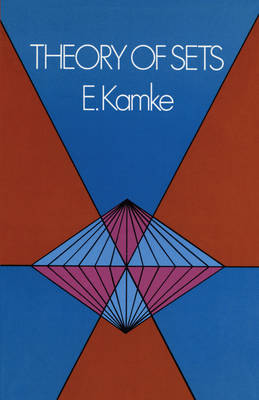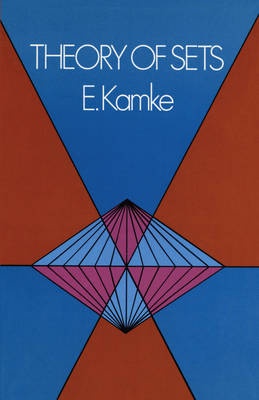
Door een staking bij bpost kan je online bestelling op dit moment iets langer onderweg zijn dan voorzien. Dringend iets nodig? Onze winkels ontvangen jou met open armen!
- Afhalen na 1 uur in een winkel met voorraad
- Gratis thuislevering in België vanaf € 30
- Ruim aanbod met 7 miljoen producten
Door een staking bij bpost kan je online bestelling op dit moment iets langer onderweg zijn dan voorzien. Dringend iets nodig? Onze winkels ontvangen jou met open armen!
- Afhalen na 1 uur in een winkel met voorraad
- Gratis thuislevering in België vanaf € 30
- Ruim aanbod met 7 miljoen producten
Zoeken
Omschrijving
"Exceptionally well written." -- School Science and Mathematics
"A very fine book." -- Mathematics Teacher
"Of real service to logicians and philosophers who have hitherto had no access to a concise and accurate introduction to the general theory of sets." -- Philosophical Review
This is the clearest and simplest introduction yet written to the theory of sets. Making use of the discoveries of Cantor, Russell, Weierstrass, Zermelo, Bernstein, Dedekind, and other mathematicians, it analyzes concepts and principles and offers innumerable examples. Its emphasis is on fundamentals and the presentation is easily comprehensible to readers with some college algebra. But special subdivisions, such as the theory of sets of points, are considered.
The contents include rudiments (first classifications, subsets, sums, intersection of sets, nonenumerable sets, etc.); arbitrary sets and their cardinal numbers (extensions of number concept, equivalence of sets, sums and products of two and many cardinal numbers, etc.); ordered sets and their order types; and well-ordered sets and their ordinal numbers (addition and multiplication of ordinal numbers, transfinite induction, products and powers of ordinal numbers, well-ordering theorem, well-ordering of cardinal and ordinal numbers, etc.).
"A very fine book." -- Mathematics Teacher
"Of real service to logicians and philosophers who have hitherto had no access to a concise and accurate introduction to the general theory of sets." -- Philosophical Review
This is the clearest and simplest introduction yet written to the theory of sets. Making use of the discoveries of Cantor, Russell, Weierstrass, Zermelo, Bernstein, Dedekind, and other mathematicians, it analyzes concepts and principles and offers innumerable examples. Its emphasis is on fundamentals and the presentation is easily comprehensible to readers with some college algebra. But special subdivisions, such as the theory of sets of points, are considered.
The contents include rudiments (first classifications, subsets, sums, intersection of sets, nonenumerable sets, etc.); arbitrary sets and their cardinal numbers (extensions of number concept, equivalence of sets, sums and products of two and many cardinal numbers, etc.); ordered sets and their order types; and well-ordered sets and their ordinal numbers (addition and multiplication of ordinal numbers, transfinite induction, products and powers of ordinal numbers, well-ordering theorem, well-ordering of cardinal and ordinal numbers, etc.).
Specificaties
Betrokkenen
- Auteur(s):
- Uitgeverij:
Inhoud
- Aantal bladzijden:
- 160
- Taal:
- Engels
- Reeks:
Eigenschappen
- Productcode (EAN):
- 9780486601410
- Verschijningsdatum:
- 18/11/2010
- Uitvoering:
- Paperback
- Formaat:
- Trade paperback (VS)
- Afmetingen:
- 137 mm x 204 mm
- Gewicht:
- 163 g

Alleen bij Standaard Boekhandel
+ 20 punten op je klantenkaart van Standaard Boekhandel
Beoordelingen
We publiceren alleen reviews die voldoen aan de voorwaarden voor reviews. Bekijk onze voorwaarden voor reviews.











